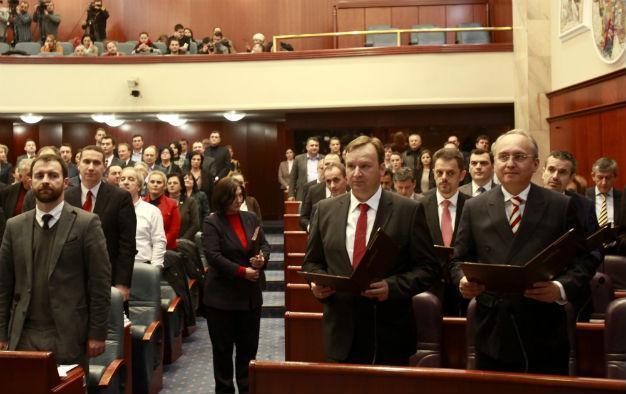Macedonia moves for April election that opposition says will boycott
SKOPJE - Reuters

AP photo
Macedonia's parliament voted on Jan. 18 to dissolve itself as of Feb. 24, clearing the way to an early parliamentary election two months later that the opposition says it will boycott.The ruling VMRO-DPMNE moved ahead with plans to hold the poll on April 24, in line with a deal brokered by the European Union mid-last year to end a bitter standoff over allegations against the conservative government of illegal phone-tapping and widespread abuse of office.
But the Social Democrats, the biggest opposition party, said they would not take part, effectively prolonging a political crisis that erupted in January 2015 when party leader Zoran Zaev began releasing a slew of damaging wire-taps.
Macedonian Prime Minister Nikola Gruevski last week tendered his resignation and lawmakers on Jan. 18 verified it and voted to dissolve parliament effective Feb. 24. Gruevski said his party would move ahead with an election on April 24, confident of victory despite the wire-tap scandal. VMRO-DPMNE secretary general Emil Dimitriev, an ally of Gruevski, was voted in as caretaker prime minister until the election.
"Our state is moving forward decisively to end this political crisis and move bravely towards the future," Gruevski told reporters after meeting his coalition partners. "This begins with the April 24 election."
After almost a decade in power, Gruevski's government was rocked last year by allegations of illegal surveillance, meddling in the media and judiciary, rigging elections and appointing party faithful to public sector jobs.
Social Democrat leader Zaev said the government had conducted the surveillance. Gruevski denied this and dismissed the accusations as a plot to bring him down.
Analysts say Gruevski's determination for the election to go ahead as planned indicates he is confident his VMRO-DPMNE party will win again.
His critics accuse Gruevski of presiding over an increasingly authoritarian government that has stoked nationalism among Macedonians in the absence of any progress towards membership of the EU or NATO, a process held hostage to a long-running dispute with neighbouring Greece over Macedonia's name.
The government has dismissed the criticism.
The Social Democrats said the EU-brokered deal was incomplete, citing the government's failure to enact media reforms to reduce its influence over news coverage and order a thorough review of the electoral roll.
"(We) cannot accept elections without free media and a cleared voter list and will not take part in such elections," the party said in a statement.
EU enlargement commissioner Johannes Hahn, who brokered the original deal, said in a statement that he "would have preferred a consensual solution by all parties." He urged all sides to make sure the election is fair.
"To achieve this, the urgent preparatory work must be stepped up, notably on the voters' lists," Hahn said.
















